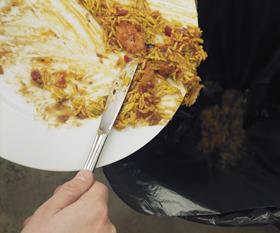
Food waste levels in Britain are down by seven per cent per person, according to a new study by Wrap.
The anti-waste charity described it as a “significant step” in reducing the UK’s food waste figures, which overall fell 480,000 tonnes between 2015 and 2018, enough to fill the Royal Albert Hall ten times.
Wrap says the reduction has saved UK citizens £1 billion per year compared to 2015. The new data comes from Wrap’s latest Courtauld Commitment 2025 milestone report, which sets out progress in food waste reduction since 2007.
Wrap pinned the progress on different factors, including heightened awareness from its Love Food Hate Waste campaign, clearer labelling on food packaging, and more local authorities offering residents separate food waste collections.
Marcus Gover, Wrap CEO said: “We are in a new decade and have just ten years if we are to honour our international commitment to halve food waste. This really matters because it is untenable that we carry on wasting food on such a monumental scale when we are seeing the visible effects of climate change every day, and when nearly a billion people go hungry every day.
“This great news announced today means we are starting to wake up to the reality of food waste, but we are too often turning a blind eye to what is happening in our homes. We are all thinking about what we can do for the environment and this is one of the most simple and powerful ways we can play our part. By wasting less food, we are helping to tackle the biggest challenges this century – feeding the world whilst protecting our planet.”
Wrap warns that its work is not done however. The report shows that UK households still waste 4.5 million tonnes of food that could have been eaten, worth £14 billion every year (£700 for an average family with children).
The volume of food still wasted equates to ten billion meals. A reduction of four per cent in the supply chain also shows good overall progress from businesses, but WRAP says many more businesses need to step up their action on food waste to help halve global food waste by 2030.
While this is the most significant drop in household food waste since 2010, Wrap’s latest annual citizen survey – also released today - found that despite more of the public being aware of theissueof food waste, less than half of the population (39 per cent) connect wasting food at home with the impact this has on the environment.
Based on self-reported estimates for the most commonly wasted foods (potatoes, bread, chicken and milk) it appears around one in three people would still be classified as being high food wasters.
Environment Secretary Theresa Villiers said:“Each year, tonnes of good-quality, nutritious food needlessly goes to waste, harming our environment and climate. As a world-leader in the fight against food waste, it is good news that we are making a real difference.
“But while this is encouraging, there is more to be done – and I urge all households, individuals and businesses to consider how they can reduce their own food waste footprint to create a better world for generations to come.”



